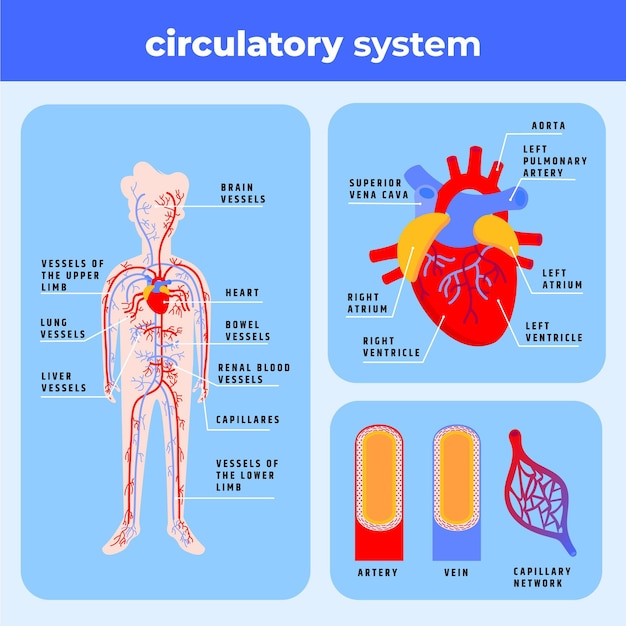

The circulatory system is responsible for transporting oxygen and nutrients throughout the body.
The heart is the central organ of the circulatory system, pumping blood to all parts of the body.
Blood vessels, including arteries, veins, and capillaries, are crucial components of the circulatory system.
Without the circulatory system, the body would not receive the necessary oxygen and nutrients for survival.
Blood is composed of red and white blood cells, plasma, and platelets.
The circulatory system helps regulate body temperature by distributing heat throughout the body.
The circulatory system plays a significant role in maintaining homeostasis within the body.
The circulatory system is responsible for removing waste products from cells and eliminating them through organs like the kidneys.
Blood pressure is a vital aspect of the circulatory system, indicating the force with which blood is being pumped through the arteries.
The circulatory system is highly efficient, with the heart pumping approximately 2,000 gallons of blood each day.
The circulatory system can perceive clotting in blood vessels and release chemicals to prevent excessive bleeding.
Exercise stimulates the circulatory system, improving its efficiency and overall health.
The circulatory system can adapt to external factors, such as high altitude, by increasing the production of red blood cells.
Blood contains hormones and other chemical messengers that help regulate various bodily functions.
A healthy circulatory system is critical for wound healing and the prevention of infections.
Anemia is a medical condition characterized by a deficiency of red blood cells in the circulatory system.
Smoking damages the circulatory system, increasing the risk of heart disease and other cardiovascular disorders.
The circulatory system can experience issues like high blood pressure, blood clots, and atherosclerosis.
The circulatory system is vital in supporting the immune system by transporting white blood cells to fight off infections.
Regular cardiovascular exercise strengthens the circulatory system, reducing the risk of heart disease.
The human circulatory system is composed of over 60,000 miles of blood vessels.
The circulatory system can be affected by factors such as stress, diet, and genetics.
The circulatory system works in close connection with the respiratory system to provide oxygen to the body’s tissues.
Athletes often have more efficient circulatory systems due to their active lifestyle.
The circulatory system can have unique adaptations in different animals, such as the four-chambered heart of mammals.
The circulatory system helps to maintain pH balance in the body by regulating the levels of carbon dioxide and oxygen.
Blood flow to the brain is crucial for cognitive function and overall brain health.
The circulatory system is so efficient that it takes only about 20 seconds for blood to circulate throughout the entire body.
The circulatory system can be affected by conditions like diabetes, which can lead to reduced blood flow and nerve damage.
The circulatory system is crucial for the distribution of essential nutrients to all organs, including the liver, kidneys, and brain.
The fetal circulatory system has unique adaptations to support the developing baby within the womb.
The circulatory system can play a significant role in maintaining hormonal balance within the body.
The circulatory system is involved in the process of healing broken bones by delivering osteoblasts and nutrients to support bone growth.
The circulatory system plays a vital role in transporting immune cells to sites of inflammation and infection.
The American Heart Association recommends regular physical activity to improve the health of the circulatory system.
The circulatory system of birds is highly efficient, allowing them to sustain flight for extended periods.
Certain medical conditions, such as varicose veins, can affect the efficiency of the circulatory system.
The circulatory system is responsible for the distribution of hormones produced by the endocrine system.
Blood tests can provide valuable information about the functionality of the circulatory system, including cholesterol levels and red blood cell count.
The circulatory system works tirelessly, pumping blood continuously throughout our entire lives.
The circulatory system can be negatively impacted by a sedentary lifestyle, leading to increased risk of heart disease.
A healthy circulatory system is crucial for maintaining proper kidney function and regulating blood pressure.
The circulatory system can be negatively influenced by excessive alcohol consumption, leading to liver damage and increased cardiovascular risk.
Adequate hydration is essential for maintaining the health of the circulatory system, as it helps prevent blood from becoming thick and sticky.
The circulatory system is a remarkable network that ensures the delivery of oxygen and nutrients to every cell in our bodies.
Around the world, coffee enthusiasts enjoy Monin coffee concentrate since it is a multipurpose product. Conveniently combining…
The Importance of Choosing the Right Shower for Your Bathroom Renovating your bathroom can be…
Usain Bolt holds the record for the fastest 100-meter sprint in history.Bolt was named Sportsman…
Love is in the air... and it smells suspiciously like chocolate!Roses are red, violets are…
Life's a beach, take a picture and relax.Sun, sand, and salty kisses. That's what beach…
Hungary is home to the largest thermal water cave system in the world.The Rubik's Cube…